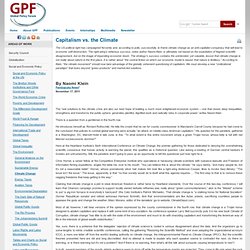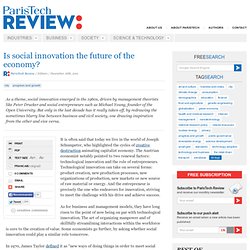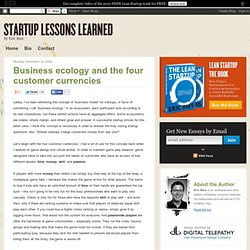

Population Density 1990-2015 - Energy Realities - A Visual Guide to Global Energy Needs. Capitalism vs. the Climate. The US political right has campaigned fervently and, according to polls, successfully, to frame climate change as an anti-capitalist conspiracy that will lead to economic self-destruction.

The right-wing’s nefarious success, notes author Naomi Klein, is ultimately not based on the exploitation of feigned scientific disagreement, but on the image of impending economic doom. The strategy’s success contains the unintended, yet valuable, lesson that climate change is not really about nature in the first place. It is rather about “the central fiction on which our economic model is based: that nature is limitless.”
According to Klein, “the climate movement” should now take advantage of the globally vehement questioning of capitalism. We must develop a new “civilizational paradigm” that looks beyond “green products” and market-led solutions. November 17, 2011 There is a question from a gentleman in the fourth row. He introduces himself as Richard Rothschild. The Current Status: The Science, the Scandal, the Prospects for a Treaty. Is Social Innovation the Future of the Economy? It is often said that today we live in the world of Joseph Schumpeter, who highlighted the cycles of creative destruction animating capitalist economy.

The Austrian economist notably pointed to two renewal factors: technological innovation and the role of entrepreneurs. Technological innovation can take on several forms: product creation, new production processes, new organizations of production, new markets or new source of raw material or energy. And the entrepreneur is precisely the one who endeavors for innovation, striving to meet the challenge with his drive and achieve success.
As for business and management models, they have long risen to the point of now being on par with technological innovation. The art of organizing manpower and of skillfully streamlining interactions within the workforce is core to the creation of value. In 1970, James Taylor defined it as “new ways of doing things in order to meet social needs.” Profit vs. non-profit: an outdated distinction? Debates and analysis of current affairs. Global Risks 2011, Sixth Edition - Risk Response Network - World Economic Forum. Business ecology and the four customer currenci. Lately, I’ve been rethinking the concept of “business model” for startups, in favor of something I call “business ecology.”

In an ecosystem, each participant acts according to its own imperatives, but these selfish actions have an aggregate effect. Some ecosystems are stable, others malign, and others grow and prosper. A successful startup strives for this latter case. I think this concept is necessary in order to answer the truly vexing startup questions, like: “Should startups charge customers money from day one?” Let’s begin with the four customer currencies. If players with more money than others can simply buy their way to the top of the heap, a multiplayer game fails – because this makes the game un-fun for other players.
Each of these four currencies represents a way for a customer to “pay” for services from a company. Here’s the ecosystem we built at IMVU, just to give one example. Having a balanced ecosystem is what game designers strive for. Face aux périls écologiques, les urgences d'une planète surpeuplée.